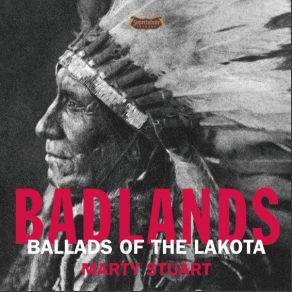Badlands
Download links and information about Badlands by Marty Stuart. This album was released in 2005 and it belongs to Rock, Country genres. It contains 14 tracks with total duration of 01:04:02 minutes.

|
|
|---|---|
| Artist: | Marty Stuart |
| Release date: | 2005 |
| Genre: | Rock, Country |
| Tracks: | 14 |
| Duration: | 01:04:02 |
| Buy it NOW at: | |
| Buy on iTunes $9.99 | |
| Buy on Amazon $17.29 | |
Tracks
[Edit]| No. | Title | Length |
|---|---|---|
| 1. | Everette Helper's Song | 1:19 |
| 2. | Badlands | 4:40 |
| 3. | Trip to Little Big Horn | 4:43 |
| 4. | Old Man's Vision | 3:01 |
| 5. | Wounded Knee | 3:13 |
| 6. | Big Foot | 3:18 |
| 7. | Hotchkiss Gunner's Lament | 4:44 |
| 8. | Broken Promise Land | 6:48 |
| 9. | Casino | 4:07 |
| 10. | So You Want to Be an Indian | 4:49 |
| 11. | Walking Through the Prayers | 6:16 |
| 12. | Three Chiefs | 9:09 |
| 13. | Listen to the Children | 5:01 |
| 14. | Everette Helper's Song (Reprise) | 2:54 |
Details
[Edit]Intention is everything. In the heart of an artist it stands where cynical, critical notice can cast aspersion. Marty Stuart has made an aesthetic life of living and creating from the heart of intention. Badlands: Ballads of the Lakota is his second album in 2005. His first, Souls' Chapel, was a rollicking, hard country record filtered through gospel music and sacred song. Badlands is no less a sacred endeavor, though it is a far more historical one, and these ballads of the great Lakota tribe are his own. He was guided by the Lakota people and their elders through the true, official record of their existence, not the account in the revisionist American textbooks, and this record has the tribe's blessing. He wrote these songs after being guided through the Lakota lands for a period of years by John L. Smith and the elders of this noble and persecuted tribe who adopted Stuart as family. History, spirituality, legend, the lineage of memory, shame, guilt, and transcendence pass through these songs in equal measure.
Produced by Stuart with John Carter Cash, the set begins with elder Everette Helper's prayer song, and then jolts into the reeling crunch of the title track where country, rockabilly, and folk music meld together into an anthem that reveals both continuity and contradiction and top those whose views are short sighted. "Trip To Little Big Horn" is the story of Custer's Last Stand with a twist: presented as a dialogue with a ghost. Mandolins, acoustic guitars, and bass are tightly knit together to offer a story that is raw, yet elegant and pure. "Old Man's Vision" is a spoken word tale backed with spare, haunting guitar and drum atmospherics. The minor key shuffle that is "Wounded Knee" is as heartbreaking a song as Stuart has ever written; there is no cheap sloganeering or paltry politics here—this song is a prayer. Great pains were taken to make every line, every word, accurate historically, though the songwriter's craft remains intact. Check the track named for the great chief Big Foot, who died at Wounded Knee, with great backing vocals from Connie Smith. And on it goes through the "Broken Promise Land," the sad, folk tale "Hotchkiss Gunner's Lament," to the hard rocking "Broken Promise Land," and the sparse, ballad of outrage that is "Casino." "So You Want To BeAn Indian," is every bit as biting as Bob Dylan's "Hattie Carroll." The field recording that opens "Walking Through Prayers" is every bit as holy and moving a tune as anything on Souls' Chapel, but far more eerie and rooted in a world that is both seen and unseen. The fusing of Christian and Indian spirituality on the nine-plus minute "Three Chiefs" (Red Cloud, Sitting Bull, and Crazy Horse) may piss some off due to its unabashed view of the songwriter at the crossroads between the two. But it's in an opinion; a belief not in fundamentalist religiosity, but in the large vision of a God bigger than human understanding who loves outside the division of creed, color, or religion.
The set essentially closes with "Listen To The Children," a sprawling rock anthem with Native overtones, strings, and screaming guitars. It's a fitting end, but it's not officially finished until the Lakota medicine man prays over the entire proceeding, blessing, closing, and sending it into the silence of the human soul and to the ears of those who have passed and hear on the wind. Badlands: Ballads of the Lakota is a milestone, a career achievement for Stuart, and an album that is unsettling, provocative, morally instructive, and deeply satisfying musically as a country record that sets the bar higher than it has been set in a long, long time.